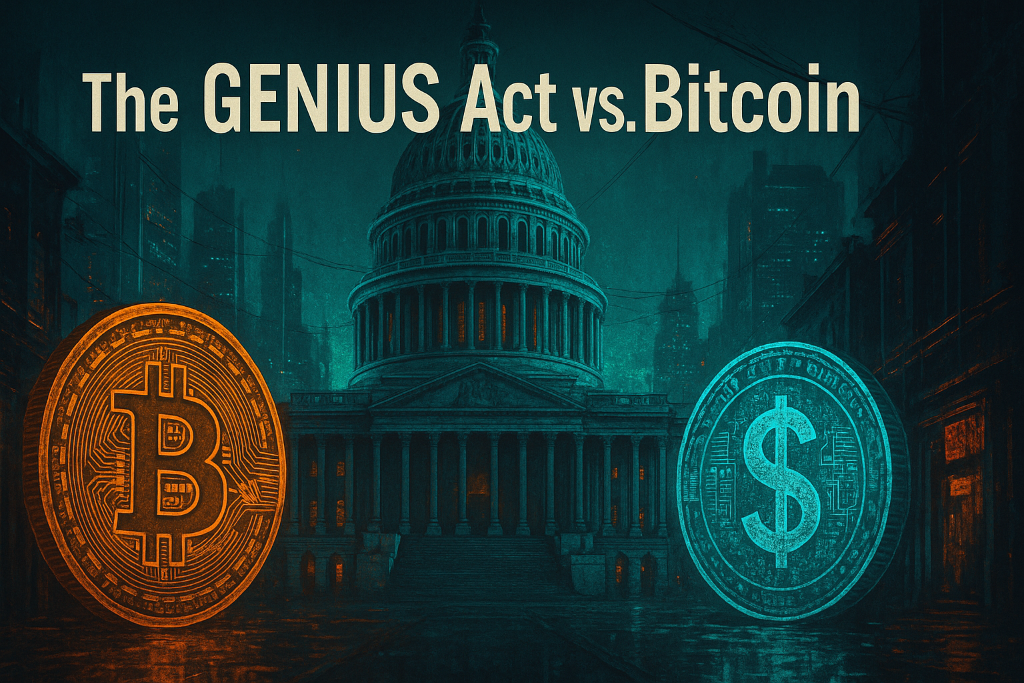As Congress pushes the GENIUS Act through the House, the world watches. Will this bill mark the dawn of a stablecoin-powered financial system—or the slow erosion of Bitcoin’s hard money dream?
The Battle for the Future of Money
In an age where financial innovation outpaces regulation, the GENIUS Act—short for Guiding and Ensuring National Innovation for U.S. Stablecoins—emerges as the most consequential piece of crypto legislation yet. Passed in the Senate with bipartisan support and heading toward a House vote during “Crypto Week,” the bill seeks to formalize stablecoins as a core part of the U.S. financial system.
But in doing so, it raises a fundamental question:
Is the GENIUS Act a step toward monetary freedom—or a clever trap to bring crypto back under fiat control?
GENIUS Act: The Nuts and Bolts
The bill lays down strict rules for stablecoin issuers:
- Only banks and licensed entities can issue compliant stablecoins.
- 100% reserve backing is mandatory—cash and short-term Treasuries only.
- Full regulatory oversight by federal or state authorities.
- Monthly transparency disclosures and annual audits.
- Explicit carveout from SEC jurisdiction: these are not securities.
- Mandatory compliance with KYC/AML and legal freeze capabilities.
This is not a laissez-faire sandbox. It’s a tight framework, designed for institutional trust and governmental control.
Bitcoin Ideology vs. Stablecoin Regulation
To understand what’s at stake, we must revisit the ethos that birthed Bitcoin:
- Hard money not subject to inflation or political whims.
- Decentralization as a defense against censorship and tyranny.
- Permissionless systems where anyone can transact, anytime.
- Code as law, not legal gatekeepers.
The GENIUS Act, for all its clarity, takes a sharply different path.
Where the GENIUS Act Supports the Bitcoin Vision
Despite the surface-level conflict, GENIUS carries some powerful benefits for crypto at large:
✅ Regulatory Clarity Spurs Adoption
For years, innovators have operated in legal gray zones. GENIUS clears the fog, opening doors for mainstream banks, fintechs, and global firms to issue USD-backed stablecoins.
✅ Programmable Money Gets Its Legal Wings
This bill sets the stage for composable finance—enabling automated, on-chain payments, smart contracts, and tokenized assets to operate with regulatory backing.
✅ SEC Jurisdiction Pullback
GENIUS strips the SEC of power over compliant stablecoins—a move that many Bitcoiners and crypto builders see as essential to preventing overreach.
Where the Act Breaks with Bitcoin Principles
For purists, the GENIUS Act doesn’t empower decentralization—it undermines it.
❌ Centralized Control Over Money
Only licensed institutions can issue stablecoins. The dream of community-governed money—like MakerDAO’s DAI—is sidelined.
❌ Compliance Over Freedom
Every GENIUS-approved coin must support KYC, AML, and token freezing. That means wallets can be blacklisted, and accounts frozen—completely at odds with Bitcoin’s censorship resistance.
❌ USD Supremacy Baked In
Bitcoin was built to escape fiat. The GENIUS Act strengthens the dollar’s digital form—possibly paving the way for a regulated U.S. stablecoin future that competes with BTC, rather than coexists.
The Inevitable Collision: Trustless vs. Trusted Systems
We are now witnessing the split between “trusted digital dollars” and “trustless digital money.”
- GENIUS bets on regulated innovation, backed by the U.S. government.
- Bitcoin bets on sovereignty through math and code, backed by no one.
Both claim to offer financial freedom—but only one removes the middleman entirely.
So, Is the GENIUS Act Good for Bitcoin?
It depends on who you ask.
- For Bitcoin maximalists: It’s a trojan horse, reinforcing fiat control while diluting the purity of decentralized money.
- For crypto pragmatists: It’s a historic leap—bridging blockchain with real-world financial systems, and possibly pulling millions into Web3 rails.
- For institutions: It’s the greenlight to finally enter digital assets without legal landmines.
Final Thoughts: A Fork in the Road
As the GENIUS Act heads to a vote in the House, the U.S. stands at a crossroads:
Will it usher in a golden age of programmable, dollar-pegged finance with safeguards and scalability?
Or will it cement a sanitized version of crypto that strays from the radical freedom Bitcoin envisioned?
Whatever your stance, one thing is clear:
The future of money is being written this week. And it won’t be written in cash.
Like what you read?
Subscribe to our newsletter for real-time insights on crypto regulation, Bitcoin ideology, and the future of digital assets.
– Man Who Knows Nothing




